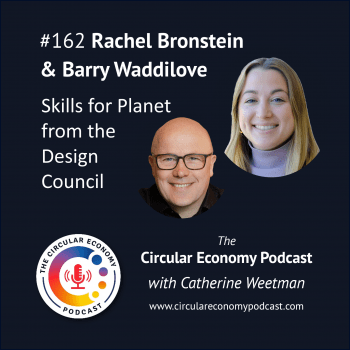Podcast: Play in new window | Download

It’s episode 162 – we’re discussing design skills and why it’s crucial that design for circularity goes beyond the design of the product itself, to cover the materials, the customer experience, the supply chain, the collection of data for KPIs, and much more.
Helping us think about this are Rachel Bronstein, a Senior Programme Manager at the Design Council, and Barry Waddilove, who is supporting the Design Council’s “Design for Planet” initiative as a Sustainable Design Expert.
The Design Council is the UK’s national champion for design, across all design disciplines, and it aims to showcase brilliance, lead on new thinking, evidence value and influence policy, so that design can thrive. Design for Planet will feature on a global stage this September, when the Design Council hosts the World Design Congress.
The Design Council’s Skills for Planet mission aims to close a critical skills gap, highlighted when research found that while 66% of designers designed for planet, yet only 43% felt that they had the capabilities they needed. So the Skills for Planet mission is to help designers develop the skills to design places, products and services that regenerate the planet.
Rachel Bronstein is leading the delivery of Skills for Planet aiming to upskill 1 million designers in green design skills by 2030. Rachel has a multidisciplinary background from her work across the private, public and third sector.
Barry Waddilove has over 30 years’ experience in design and sustainability with brands and organizations across 25 countries. Barry has been working on circular economy projects since 2014, and most recently he’s has been working for the Swedish Consumer Electronics company Electrolux Group, as Head of Circular Economy and Partnerships in the global sustainability leadership team in Stockholm.
Rachel outlines the Skills for Planet Blueprint , co-created with over 100 design experts across industry, education and government. It provides a cross-disciplinary set of eighteen Green Design Skills across six interconnected areas: Regenerating Nature, Embedding Circularity, Eliminating Emissions, Empowering Green Communities, Influencing Green Behaviour, and Evaluating Green Impact.
We’ll hear more about the blueprint, the broader role of design in business and why it’s so important that business leaders understand the role of design and how it can support change projects, particularly around the circular economy.
We talk about the challenges in designing for circularity, and the opportunities that can come from partnerships and new business models. Barry and Rachel highlight a range of areas where design can play a key role, including making use of digital tools and data.
We discuss the importance of embracing complexity and the need for systemic approaches, and how to think about some of the conflicts and trade-offs that come up when we’re trying to design circular solutions.
Stay in touch for free insights and updates…
Read on for more on our guest and links to the people, organisations and other resources we mention.
Links we mention in the episode:
Links for our guest:
- Rachel Bronstein on LinkedIn
- Barry Waddilove on LinkedIn
- The Design Council website: Make life better by design – Design Council
- The Skills for Planet Blueprint webpage: Skills for Planet – Design Council
Books, people and organisations we mentioned
- Episode 155 Martin Tomitsch and Steve Baty: Life-centred design https://www.rethinkglobal.info/155-martin-tomitsch-and-steve-baty-life-centred-design/
Guest bios
Rachel Bronstein is a Senior Programme Manager at the Design Council, the UK’s national champion for design. She is currently leading the delivery of the Design Council’s Skills for Planet Mission, which aims to upskill 1 million designers in green design skills by 2030, thereby galvanising the design sector to fulfil its potential in driving the green transition.
Having worked across the private, public and third sector, Rachel brings her multidisciplinary background to programmes at the Design Council. As a consultant, she was fortunate to work on a variety of projects – from designing a service to help streamline exports post-Brexit at the Department for International Trade, to re-defining the British Business Bank’s Employee Value Experience and transforming AVON’s customer experience.
Rachel has completed a year-long social leadership programme called On Purpose, which gave her the opportunity to transfer her skills to purpose-led organisations. Through the programme she received training on systems thinking, measuring impact, building movements, and values-led leadership. She leads programmes with a greater awareness of herself, others, and wider impact as a result.’
Barry Waddilove has 30+ years’ experience in design and sustainability with brands and organizations across 25 countries. During various roles at global corporates, he has developed deep knowledge of innovation processes and business model development. His academic research for the Ellen MacArthur Foundation and Cranfield University during 2014 and 2015 explored the role of System Design in Circular Business Model Development.
Most recently Barry has been working for the Swedish Consumer Electronics company Electrolux Group, first leading their US design team based in Charlotte, NC and then later joining the global sustainability leadership team in Stockholm as Head of Circular Economy and Partnerships. He is also currently supporting the UK Design Council’s “Design for Planet” initiative as a Sustainable Design Expert.
Barry holds an MDes in Design and Innovation for Sustainability from Cranfield University and is also a fellow of the RSA (The Royal Society for the encouragement of Arts, Manufactures & Commerce).
About Design Council
The Design Council is the UK’s national champion for design and is dedicated to all design disciplines. Their role is to showcase brilliance, lead on new thinking, evidence value and influence policy to create an environment in which design can thrive. This September the Design Council is hosting World Design Congress, putting its Design for Planet mission on a global stage.
About Skills for Planet
The Design Council’s Skills for Planet Mission came about in response to research, which found that while 66% of designers designed for planet in 2024, only 43% felt that they had the capabilities required to do so. This evidences a troubling gap between the demand for green design skills, and the supply.
The Design Council launched its Skills for Planet Mission to close this skills gap, setting out to upskill 1 million designers in green design skills by 2030. This work is critical because it will enable the design sector to fulfil its potential as a backbone of the green transition, powered by designers who have the skills needed to design places, products and services that regenerate the planet, rather than destroy it.
About Skills for Planet Blueprint
The skills that designers need to design for planet are defined in the Skills for Planet Blueprint. The Blueprint is the Design Council’s first milestone towards the Skills for Planet Mission, providing a shared language that enables the whole design sector to pull in the same direction and have maximum positive impact on the planet and its people.
The Blueprint was co-created with over 100 design experts across industry, education and government. The result is a cross-disciplinary set of eighteen Green Design Skills, which are organised into six interconnected areas: Regenerating Nature, Embedding Circularity, Eliminating Emissions, Empowering Green Communities, Influencing Green Behaviour, and Evaluating Green Impact.
Please let us know what you think of the podcast – and we’d love it if you could leave us a review on iTunes, or wherever you find your podcasts. Or send us an email…
Podcast music
Thanks to Belinda O’Hooley and Heidi Tidow, otherwise known as the brilliant, inventive and generous folk duo, O’Hooley & Tidow for allowing me to use the instrumentals from the live version of Summat’s Brewin’ as music for the podcast. You can find the whole track (inspired by the Copper Family song “Oh Good Ale”) on their album, also called Summat’s Brewin’. Or, follow them on Twitter.
